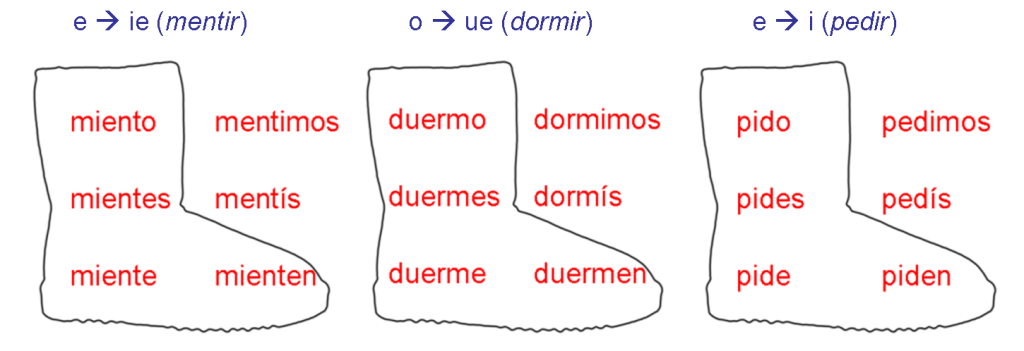In a previous post I described the origin of the three main categories of Spanish “boot” verbs, shown below:
 The first two types of vowel change, from e →ie and from o →ue, are found in all three Spanish conjugation classes: -ar, -er, and -ir verbs. The third type, with a vowel change from e →i, is only found in –ir verbs. I also described how a fourth change for -ir verbs, from o →u , was sidetracked, with the relevant verbs switching over entirely to u (e.g. mullir, from Latin mollire).
The first two types of vowel change, from e →ie and from o →ue, are found in all three Spanish conjugation classes: -ar, -er, and -ir verbs. The third type, with a vowel change from e →i, is only found in –ir verbs. I also described how a fourth change for -ir verbs, from o →u , was sidetracked, with the relevant verbs switching over entirely to u (e.g. mullir, from Latin mollire).
At the time I overlooked a simple yet dramatic truth: the “boot” pattern has taken over all possible -ir verbs! This amounts to a significant difference between -ir verbs and -ar/-er verbs. When you learn a new -ar or -er verb that might be a boot verb (say, the hypothetical verbs felar and foler), you need to check a dictionary to see how the verb works. Is it regular, in which case the present tense forms are (yo) felo and (yo) folo, or boot (fielo, fuelo)? For a hypothetical -ir verb like felir, this question is moot: it’s a boot verb for sure. The only remaining issue is which type it is, i.e. fielo or filo.
[Note that the total change of o →u in -ir verbs means that one will never encounter a new verb like folir; it would have changed to fulir.]
To verify this generalization, have a look at the comprehensive list of -ir verbs at intro2spanish.com (a website with which I am not affiliated; I just admire their verb lists). With a single bizarre exception (abolir, see below), every verb on the list whose final stem vowel is e or o is a “boot” verb.
FYI abolir (click for conjugation) belongs to yet another weird category: it’s a so-called “defective verb”, which means that its only allowed forms are those whose verb ending begins with i. For the present tense, this means that the verb only exists in the nosotros and vosotros forms, which are both outside the “boot”.
This generalization about -ir boot verbs is hardly earth-shaking. In fact, if you’re not a Spanish grammar lover, you’re probably asleep by now (but then how can you still be reading???). To me, though, it is somehow aesthetically pleasing. These -ir boot verbs are weird in general — consider their gerunds (dUrmiendo, sugIriendo) and preterits (dUrmió, sugIrió). Shouldn’t their present tense be special, too?
“I” seems an interesting vowel. Most rules I have found mark it as weak and therefore subject to blending in diphthong formation and yet….my ear doesn’t hear “weak” in the first position like in ciudad but I do in words like cuidar. Do you know of any pronunciation rules that govern this oddity?
Kristen,
I’m going to use the adjective “high” to describe the vowel /i/, instead of “weak”. The vowel /u/ is also high. According to the Real Academia (RAE), a sequence of the two high vowels /i/ and /u/ IN EITHER ORDER forms a diphthong. So “ciudad” and “cuidar” both have two syllables, the first of which contains a diphthong. The “ciu” part of “ciudad”should rhyme with English “view”, and the “cui” part of “cuidar” should rhyme with “twee”.
My mouth and ear want to do the same thing of yours, and pronounce “ciudad” as three syllables, ci.u.dad. In this case, the two vowels are described as being “in hiatus”. The RAE mentions this as a possible outcome in SOME dialects for SOME words, including “triunfo”. But they specifically oppose the “triunfo” example to “ciudad”, implying that “iu” in the latter is uniformly diphthongized in Spanish pronunciation.
That’s the official line; I hope it helps. If you’re truly curious, see this explanation on the RAE website http://www.rae.es/dpd/srv/search?id=GoV5Y32DaD60gSzhl5; I can email you a scan of the relevant paragraph of their “Ortografía”. FYI Spanish Wikipedia says the same thing: http://es.wikipedia.org/wiki/Diptongo#Formados_por_dos_vocales_cerradas_diferentes
Buenas noches,
Judy